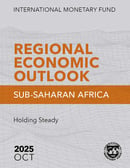This web page provides information on the activities of the Office, views of the IMF staff, and the relations between Rwanda and the IMF. Additional information can be found on Rwanda and IMF country page, including official IMF reports and Executive Board documents in English that deal with Rwanda.
At a Glance
- Rwanda joined the Fund in Joined: September 30, 1963
- Total Quotas: SDR 80.1 Million
- Loans outstanding: Poverty Reduction and Growth Facility (PRGF) arrangements SDR 9.72 million
- Last Article IV Consultation: 2014 Article IV Consultation and Second Review Under the Policy Support Instrument, (Country Report No. 14/343)
Office Activities
Recruitment Notice of an Office Manager in the Kigali office.
Interested candidates who match the criteria above are requested to send their CVs, along with cover letters to rr-rwa@imf.org no later than March 3, 2023.
February 17, 2023
IMF’s Abebe Aemro Selassie on Investment and Sustainable Debt Management in Africa
CNBC Interview
August 1, 2019
IMF's Work on Rwanda
No results found. Either there was an error with the web service or there is no data returned by the web service.
Regional Economic Outlook
October 16, 2025

The outlook for Sub-Saharan Africa is showing resilience, despite a challenging external environment with uneven prospects in commodity prices, still tight borrowing conditions, and a deterioration of the global trade and aid landscape.
Read the Report
Fraudulent Scam Emails Using the Name of the IMF
For more information please see Fraudulent Scam Emails Using the Name of the IMF
African Departmental Papers
 The Departmental African Paper Series covers research on sub-Saharan Africa conducted by International Monetary Fund (IMF) staff, particularly on issues of broad regional or cross-country interest. The views expressed in these papers are those of the author(s) and do not necessarily represent the views of the IMF, its Executive Board, or IMF Management.
The Departmental African Paper Series covers research on sub-Saharan Africa conducted by International Monetary Fund (IMF) staff, particularly on issues of broad regional or cross-country interest. The views expressed in these papers are those of the author(s) and do not necessarily represent the views of the IMF, its Executive Board, or IMF Management.



